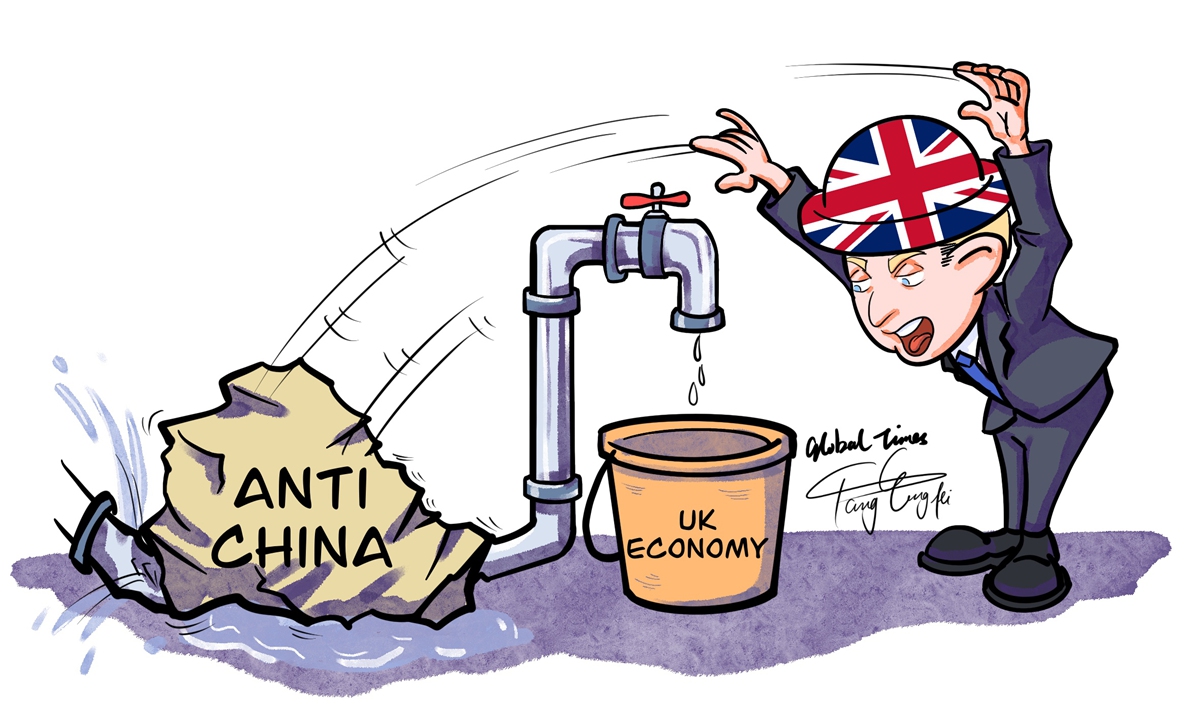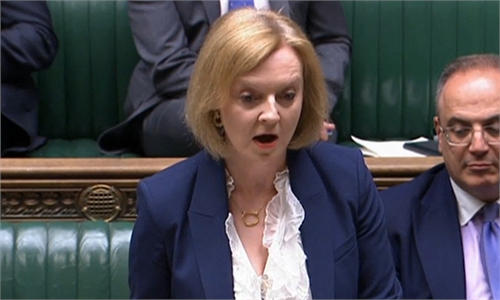
Illustration: Tang Tengfei/Global Times
The British Government has blocked the takeover of British electronic design company Pulsic by Super Orange HK, a company from China's Hong Kong Special Administrative Region, UK media outlet the Telegraph reported on Thursday, in a fresh sign of growing hostility in the UK toward Chinese investment.The UK's move against Super Orange HK is one of the first cases of its National Security and Investment Act being used to stop a deal, a law passed in January that lets UK ministers block transactions with so-called security guise, which is often used by Western countries like the US and the UK to crack down on Chinese companies when they can't find any grounds.
While bilateral ties between China and the UK are deteriorating due to some UK politicians' hostile stances against China on a slew of issues regarding Hong Kong, Xinjiang and Huawei, the Telegraph said that the UK's decision on Super Orange HK signals the UK's "increasing aversion to Chinese involvement in its economy."
Stopping the Super Orange HK acquisition comes as the UK's intensifying discriminatory treatment toward Chinese companies has already been undermining its own business environment and Chinese companies' confidence.
In addition to the Johnson government's arbitrary Huawei ban, the UK government also reportedly works to end China General Nuclear Power's involvement in UK nuclear power projects, probes a Chinese-led takeover of Newport Wafer Fab, while some British lawmakers are calling for a ban on the sale of closed-circuit television cameras from Chinese firms Hangzhou Hikvision and Zhejiang Dahua.
Any rational person will understand that the greatest risk to Britain's national security is clearly not the investment of some Chinese companies, but the deterioration of its own economic predicament. Inflation in the UK topped 10 percent in July, its highest level in 40 years. The Bank of England forecasts the UK economy to start a recession in the fourth quarter of this year and continue through early 2024. If British politicians allow their hostility to China to further undermine economic ties between the two countries, the UK's economic predicament will only get worse.
However, even amid the plight of the British economy, the two candidates for British prime minister - Rishi Sunak and Liz Truss - have not shown the courage to face this real problem, but actually engaged in a twisted who-is-tougher-on-China competition to solicit votes. Both Sunak and Truss have gone to great lengths to demonstrate that they will be as tough on China as possible. It seems the UK will focus more on the so-called security issues under either Sunak or Truss, while the trade issue could be overlooked.
If such a trend continues, the atmosphere of bilateral mutual trust and cooperation between China and the UK will further deteriorate.
As to whether escalating tensions with China are beneficial or harmful to the British economy, the British business community has provided an honest answer, not anti-China politicians. Steven Lynch, managing director of the British Chamber of Commerce in China, said in an interview with Chinese media recently that the importance of a strong Britain-China relationship cannot be understated. He said trade and investment relations between the two sides truly matter as they are mutually beneficial.
Numbers don't lie. China is the UK's third-largest trading partner, accounting for nearly 7 percent of UK global trade. The bilateral trade in goods exceeded $100 billion in 2021. According to data from the UK Office for National Statistics, China was the UK's largest source of imports and sixth-largest destination for exports in 2021.
Commenting on the "China-bashing contest" in the UK's election campaign, a spokesperson for the Chinese Embassy in the UK in late July noted that instigating tougher policies against China wouldn't solve the UK's own problems, and would instead lead the country further astray.
If British politicians continue to take an approach of blaming China for every problem in the UK to distract the UK public's attention away from its economic woes, it is dangerous for their domestic economy. Hostility toward China doesn't help the UK's national security in any way, but will instead endanger the British economy and accelerate the deterioration of its economic predicament.
The author is an editor with the Global Times. bizopinion@globaltimes.com.cn



